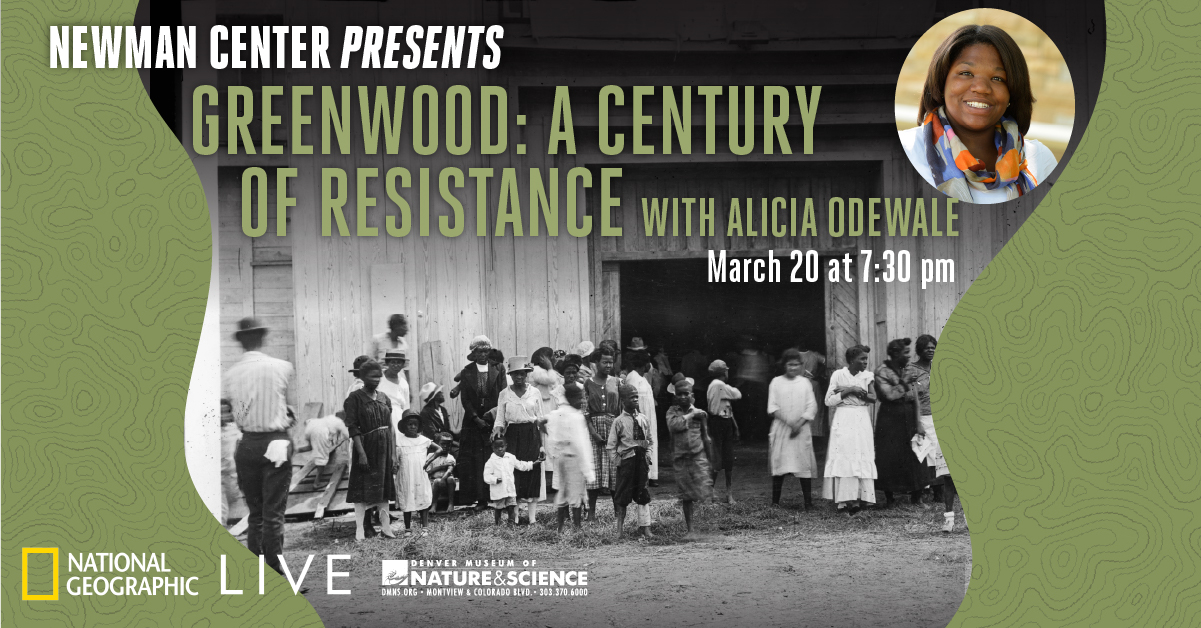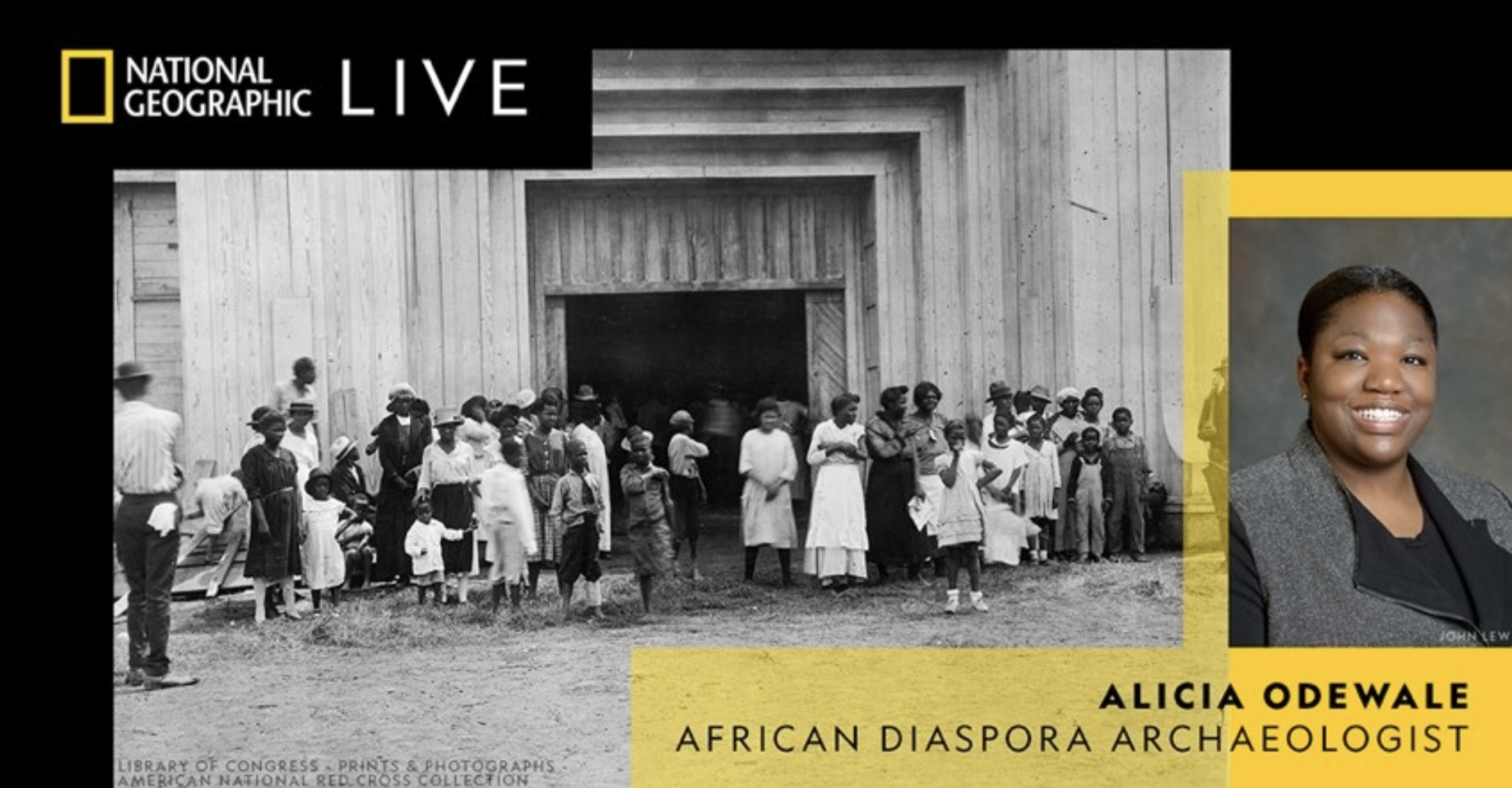
Dr. Alicia Odewale, an African Diaspora archaeologist, is scheduled to give a presentation titled "Greenwood: A Century of Resilience" as part of the National Geographic Live series at the Robert and Judi Newman Center for the Performing Arts at the University of Denver. Dr. Odewale's work is focused on community-centric, anti-racist, and Black feminist archaeology, with a specific emphasis on uncovering stories of resilience in the wake of the Tulsa Race Massacre, one of the worst episodes of racial violence in American history. In her presentation, Dr. Odewale will explore how archaeology and radical mapping can be used as a tool for recovering lost stories, reclaiming a narrative, and pursuing restorative justice. National Geographic Live is known for bringing audiences behind-the-scenes stories, unforgettable imagery, and gripping footage from world-renowned photographers, scientists, writers, filmmakers, and adventurers.
Get your tickets, here.
The Denver Museum of Nature & Science had an opportunity to ask her a few questions:
Q&A with Alicia Odewale:

What’s your connection to National Geographic, how did you get involved with National Geographic Live?
That’s a good question. It’s definitely not something I dreamed of doing when I was a little girl, I didn’t know what a National Geographic Explorer was, let alone that I could become one, so I get this question a lot, especially from students because there’s no single path to becoming a National Geographic Explorer and it has nothing to do with attending university, enrolling in a specific program, and there’s no way to just sign up or join. So it's sort of a mystery to students how you even break into the world of National Geographic. But I’m thankful that I get to use this moment while I’m here to demystify the process for as many people as possible because we need more Explorers and live speakers from all over the world, from different professions, different cultural backgrounds, and especially more people of color to join in the fun. The easiest way to get involved with National Geographic and become a National Geographic Live Speaker is to apply and be awarded a grant through the National Geographic Society. Those who receive one of these grants automatically become explorers for life and become part of the Nat Geo family. My specific path was a bit different because instead of starting with a grant, my journey to becoming a National Geographic Explorer started with developing my own National Geographic Live show. I got an email out of the blue from one of the directors of Nat Geo Live with an invitation to be one of their speakers and develop my own storytelling experience live on stage. This invitation was really timely because this all happened in 2021, the centennial year of the Tulsa Race Massacre, and one thing that really bothered me at this time was the fact that during the 100-year anniversary people from all over the country poured into Greenwood but as soon as the commemoration events ended, the story of Greenwood seemed to fade into the background of national consciousness again. I had been looking for ways that we could continue to tell Greenwood’s story in and outside of formal classroom spaces, keep Greenwood in the forefront of public discussions of Black heritage sites and tear down the myth that Greenwood/Black Wall Street was completely destroyed in 1921 and no longer exists today. In the process of developing our show “Greenwood: A Century of Resilience”, I learned more about the grants available through the National Geographic Society and in the summer of 2022 officially became a Nat Geo explorer when I earned my own grant.
If you had to pick one aspect of your work that you find the most interesting, which would it be and why?
One thing I love about my job is that I can be a mom, a professor, an archaeologist, and a National Geographic Explorer all at once. And having the ability to experience other places and travel with my babies is the best part of the adventure. In every city we have traveled to doing this show for National Geographic Live, we have seen so many funny and interesting things. One of our funniest adventures happened during our trip to Seattle. While we were there I took my kids on the ferry ride over to a little town called Poulsbo. When we got off the ferry we looked around everyone and everything in the town was dressed up like Vikings with old English style architecture and lots of people with long beards and helmets with horns. My daughter started shouting “were in the how to train your dragon movie mommy” I want my own dragon. So we went on a search to find dragons all over town and in the process we found a sword in the stone so naturally we have to try to pull it out but we all just ended up falling off the rock.
Through this Live Speaker series, I love having the opportunity to share my family story and this story of Black heritage in Oklahoma with the world. I feel like every new city we get to experience has given something back to us when we find something new to explore and my kids and I learn about what life is like in a new place. Every place has its own secret history, its own stories, its own heritage sites and I’m grateful I get to explore all of it both in and outside of my classroom.
What do people to take away from your National Geographic Live presentation?
I can’t speak to what everyone takes away from seeing this live show, but those who have reached out to me after the show all share a desire to learn more, lean in, and do something active beyond what they just heard. I think for a lot of people the show just highlights how this story in Oklahoma is similar to other communities that have experienced or continue to experience racial violence and tension in our world, and for others this is the first time they are learning about Greenwood or the Tulsa Race Massacre so it can lead to feelings of anger and questions about what other major events in history they might have missed that were intentionally left out of their history books.
What advice would you give to the next generation or somebody who wants to do what you do/follow in your footsteps?
I’ve only been an official National Geographic Live Speaker for one year now and even though I have been teaching and doing my archaeological research for a while, to be honest I’m still learning what all of this means. So I am not sure if I have advice for anyone else just yet but I’m excited to learn more, what opportunities and resources are available to me now, and how I can use these new connections to help my family, my community and my students achieve their dreams. But so far, what I’ve learned being and archaeologist and part of the explore community means joining a network of people who are all doing amazing things in the world using the National Geographic platform. In the short time I’ve been an Explorer, I’ve met photographers, rocket scientists, primatologists, marine biologists, Egyptologists, shark divers, wildlife conservationists, and archaeologists from all corners of the world. To me being a National Geographic Explorer means a chance to change things, a chance to break down the barriers keeping folks like me out of this network. It’s a responsibility to not only spread awareness and bring others into our community and our work, but there’s also a responsibility to share whatever I learn in the process of being an Explorer with everyone around me. So I guess my advice to the next generation would be don’t be afraid to lean into what you’re passionate about even if you’re the only one with that interest. You may have been given that unique path for a reason so don’t be afraid to walk it alone, you may find your community along the way.
###

About Dr. Alicia Odewale
Dr. Alicia Odewale is an Assistant Professor of Anthropology at The University of Tulsa. Her research and teaching focuses on archaeological sites of African heritage in St. Croix, U.S. Virgin Islands, and Oklahoma. In addition to her role as faculty at The University of Tulsa (TU), she also serves as the director of the Historical Archaeology and Heritage Studies Laboratory at TU and serves as the co-creator of the Estate Little Princess Archaeological Field School in St. Croix that trains local students in archaeological methods and other STEM-related skills for free. Dr. Odewale’s research has received awards and support from the American Anthropological Association, the National Science Foundation, the Society of Historical Archaeology, the Tulsa Race Massacre Centennial Commission, the Tulsa Community Foundation, SREB-State Doctoral Scholars Program, and the Digital Archaeological Archive of Comparative Slavery (DAACS).
About National Geographic Live:
Additional information, including individual show descriptions and ticket prices can be found at newmancenterpresents.com.
